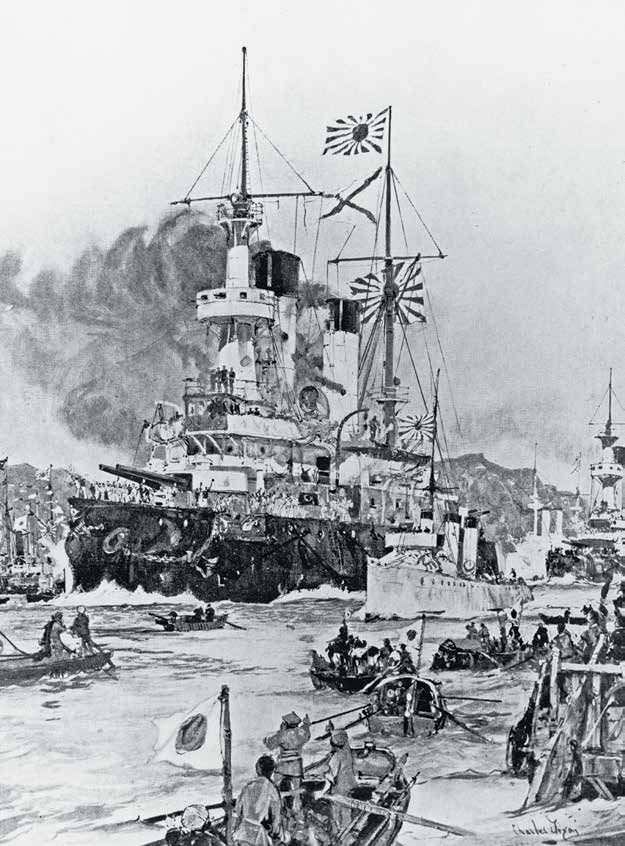How Japan Plans to Keep its Seas Open and Free , With more than just American Help.

As an island nation, the sea defines Japanese identity. For centuries, the sea separated those who lived on the main four islands from those who lived in the thousands of smaller islands that make up the archipelago. The history of how Edo (or modern-day Tokyo) reached out to incorporate all these islands provides a fascinating glimpse into how Japan became a modern nation—Japan’s modernisation.
Pre-modern Japan may have isolated itself from the outside world, but to the south, the Ryukyu kingdom, a peaceful nation of traders and navigators, traversed Asia’s waters in search of resources. Lords in Satsuma and Choshu saw the profits to be had in Ryukyu trade and, within decades, the new Meiji state had colonised what is today Okinawa prefecture. Similarly to the north, Japanese traders and fishermen crossed the frigid seas from Hokkaido to its outer islands to lay claim on what the Japanese today call the Northern Territories, four islands rich in fisheries and natural resources—islands which, after repeated wars, are now occupied by Russia.
For much of Japan’s modern history, the sea has protected the Japanese from their neighbours. Isolationist Edo wanted nothing to do with outsiders, but a few intrepid Japanese left their country to sail the seas and became memorable in the story of Japan’s rise to power. Only the Western naval nations had the ability to burst Edo’s fiction of impermeability, and the arrival of Commodore Perry in 1853 with his “black ships” sent the feudal government into a tailspin that ultimately changed the trajectory of modern Japanese history. A shipwrecked young man, picked up and educated by the captain of an American ship, facilitated the diplomacy that led to the commercial treaty sought by Perry.
هذه القصة مأخوذة من طبعة January 16, 2017 من Outlook.
ابدأ النسخة التجريبية المجانية من Magzter GOLD لمدة 7 أيام للوصول إلى آلاف القصص المتميزة المنسقة وأكثر من 9,000 مجلة وصحيفة.
بالفعل مشترك ? تسجيل الدخول
هذه القصة مأخوذة من طبعة January 16, 2017 من Outlook.
ابدأ النسخة التجريبية المجانية من Magzter GOLD لمدة 7 أيام للوصول إلى آلاف القصص المتميزة المنسقة وأكثر من 9,000 مجلة وصحيفة.
بالفعل مشترك? تسجيل الدخول

Layers Of Lear
Director Rajat Kapoor and actor Vinay Pathak's ode to Shakespeare is an experience to behold

Loss and Longing
Memories can be painful, but they also make life more meaningful

Suprabhatham Sub Judice
M.S. Subbulakshmi decided the fate of her memorials a long time ago

Fortress of Desire
A performance titled 'A Streetcart Named Desire', featuring Indian and international artists and performers, explored different desires through an unusual act on a full moon night at the Gwalior Fort

Of Hope and Hopelessness
The body appears as light in Payal Kapadia's film

Ruptured Lives
A visit to Bangladesh in 2010 shaped the author's novel, a sensitively sketched tale of migrants' struggles

The Big Book
The Big Book of Odia Literature is a groundbreaking work that provides readers with a comprehensive introduction to the rich and varied literary traditions of Odisha

How to Refuse the Generous Thief
The poet uses all the available arsenal in English to write the most anti-colonial poetry

The Freedom Compartment
#traindiaries is a photo journal shot in the ladies coaches of Mumbai locals. It explores how women engage and familiarise themselves with spaces by building relationships with complete strangers

Love, Up in the Clouds
Manikbabur Megh is an unusual love story about a man falling for a cloud. Amborish Roychoudhury discusses the process of Manikbabu's creation with actor Chandan Sen and director Abhinandan Banerjee